
Humpty Dumpty is a character in an English nursery rhyme, probably originally a riddle and one of the best known in the English-speaking world. He is typically portrayed as an anthropomorphic egg, though he is not explicitly described as such. The first recorded versions of the rhyme date from late eighteenth-century England and the tune from 1870 in James William Elliott's National Nursery Rhymes and Nursery Songs. Its origins are obscure, and several theories have been advanced to suggest original meanings.

"Goodnight, Irene" or "Irene, Goodnight," is a 20th-century American folk standard, written in 3
4 time, first recorded by American blues musician Huddie 'Lead Belly' Ledbetter in 1933. A version recorded by the Weavers was a #1 hit in 1950.

"China" is a song by American singer-songwriter and musician Tori Amos, released as the third single from her debut studio album, Little Earthquakes. It was issued on January 20, 1992, by EastWest Records in the United Kingdom. It was the first song written for Little Earthquakes and was originally titled "Distance"; a recurring lyric and theme in the song. It was originally submitted to the Library of Congress in 1987.
"One Has My Name (The Other Has My Heart)" is a 1948 song by singing cowboy Eddie Dean, his wife Lorene "Dearest" Dean, and Hollywood songwriter Hal Blair. The song was first recorded by Jimmy Wakely and was his third release on the Folk Best Seller charts and his first number one. Within two years of the song's release, two additional versions of "One Has My Name (The Other Has My Heart)" made the country charts, recorded by Eddie Dean and by Bob Eberly.
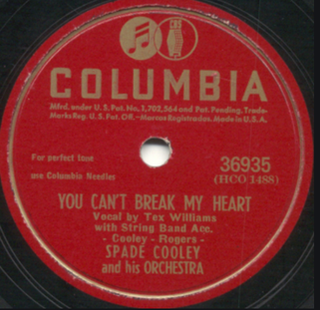
"You Can't Break My Heart" is a country music song written by Spade Cooley and Smokey Rogers, performed by Spade Cooley and His Orchestra, and released on the Columbia label. In April 1946, it reached No. 3 on the Billboard folk chart. It was also ranked as the No. 19 record in Billboard's 1946 year-end folk juke box chart.
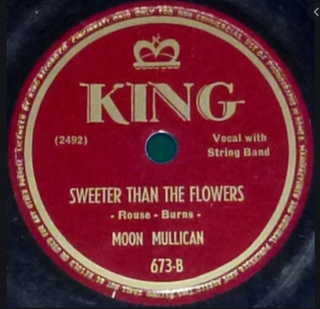
"Sweeter than the Flowers" is a country music song co-written by Ervin T. Rouse, Morry Burns, and Syd Nathan. It was sung by Moon Mullican and released on the King label. In May 1948, it reached No. 3 on the Billboard folk best seller and juke box charts. It was also ranked as the No. 9 record on Billboard's 1948 year-end folk record sellers chart.
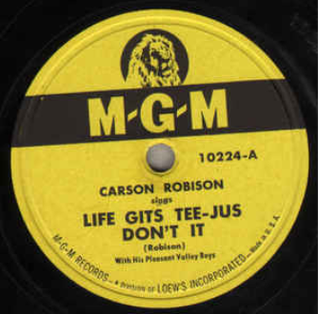
"Life Gets Tee-Jus Don't It" is a country music song/spoken word recital that was written and sung/spoken by Carson Robison and released on the M-G-M label. In August 1948, it reached No. 3 on the Billboard folk best seller and juke box charts. It was also ranked as the No. 7 record on Billboard's 1948 year-end folk record sellers chart.
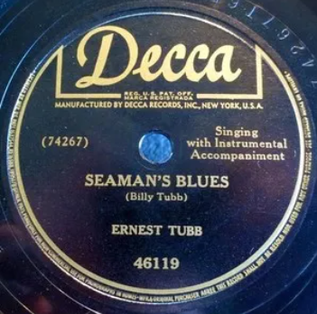
"Seaman's Blues" is a country music song written by Billy Tubb, performed by Ernest Tubb, and released on the Decca label. In May 1948, it reached No. 5 on the Billboard folk best seller chart. Furthermore, it secured the position of No. 16 on Billboard's year-end folk record seller's chart for 1948.
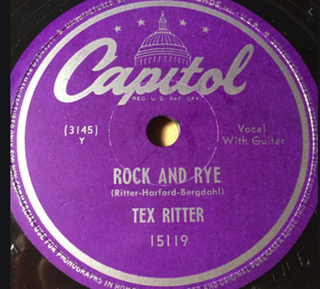
"Rock and Rye" is a country music song written by Tex Ritter, Frank Harford, and Edith Bergdahl, sung by Ritter, and released on the Capitol label. In July 1948, it reached No. 5 on the Billboard folk best seller chart. It was also ranked as the No. 19 record on Billboard's 1948 year-end folk record sellers chart.

"Tennessee Moon" is a country music song written by Gene Branch, sung by Cowboy Copas, and released in 1947 on the King label. In July 1948, it reached No. 7 on the Billboard folk best seller and juke box charts. It was also ranked as the No. 27 record on the Billboard 1948 year-end folk record sellers chart.

"To My Sorrow" is a country music song written by Vernice J. McAlpin, sung by Eddy Arnold, and released in 1947 on the RCA Victor label. In November 1947, it reached No. 2 on the Billboard folk juke box chart. It was also ranked as the No. 12 record on the Billboard 1947 year-end folk juke box chart.
The Billboard Top Folk Records of 1948 is a year-end chart compiled Billboard magazine ranking the year's top folk records based on record sales. In 1948, country music records were included on, and dominated, the Billboard folk records chart.

"That's How Much I Love You" is a country music song written by Arnold, Fowler, and Hall, sung by Eddy Arnold, and released in 1946 on the RCA Victor label. In October 1946, it reached No. 2 on the Billboard folk chart. It was also ranked as the No. 10 record on the Billboard 1946 year-end folk juke box chart.
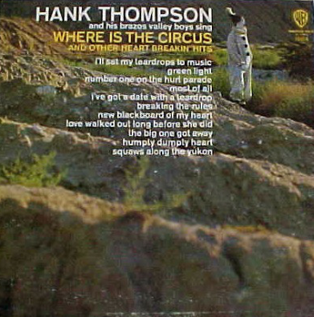
Where Is the Circus (And Other Heart Breakin' Hits) is an album by country music artist Hank Thompson and His Brazos Valley Boys. It was released in 1966 by Warner Bros. (catalog no. W1664). Joe Allison was the producer.
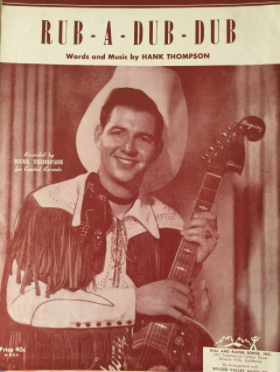
"Rub-A-Dub-Dub" is a country music song written by Hank Thompson, performed by Thompson and His Brazos Valley Boys and released on the Capitol label. It is based on the 18th century nursery rhyme, "Rub-a-dub-dub". It was Thompson's second hit record based on a nursery rhyme, following his 1948 recording of "Humpty Dumpty Heart".












